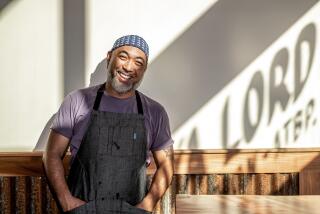Rib Tasters’ Conduct Questioned : Possible Conflicts of Interest Raised in Competition
- Share via
Call it a tempest in a teapot or a classic case of sour grapes. Call it disorganized or a few coincidences. In the aftermath of the recent third annual National Rib Cook-Off in Cleveland, participants are calling the contest results and judging procedures all of the above. And that’s not to mention what they’re calling each other.
The imbroglio temporarily puts questions of conflict of interest out of the political arena and into the barbecue pit. The contest organizer, who was not a judge, was a paid consultant to the winner before the event, and one of the 30 judges is negotiating a limited partnership with the winner.
And then there are the judging criteria--which were changed after the contestants arrived--and the judges--about a third of whom were different from the first day of judging to the second--and the judging procedure itself, half of which was not conducted blindly. In the end, though, the judges selected the winner from among 21 finalists in a blind process.
Said organizer Gary Jacob: “The judging was well-organized, well-orchestrated and in its final analysis, quite objective.” Out of the three years the contest has been held, “this was the most coordinated judging we had to date,” Jacob said.
One Entrant From Down Under
The cook-off, which this year involved 48 restaurants from 27 states, plus an entrant from Australia, aims to choose the best ribs in the nation. In addition, awards were given for the best sauce, the best baby back ribs, the best spare ribs and the best ribs in Ohio.
The ribs were judged on plate presentation and/or appearance, quality and/or tenderness, best sauce and/or seasoning and best overall taste. Two categories--originality of recipe and authenticity of recipe--were eliminated when the judges arrived because the judges felt they were repetitive and unclear, said Jacob.
According to some of the contestants, judges and observers, it was a fun and friendly affair--a chance for the good ole boys of barbecue to do some back slapping and rib tasting. So it was for Cleveland residents, who were invited on the four days before the judging to a massive rib feast, paying a $2 entrance fee, plus a charge for each slab. After that, a panel of about 30 judges spent two days making the big decisions.
Contestants paid from $1,500 to $1,700 to enter the contest, a fee that Jacob said paid for the participants’ tents, tables, chairs, electricity, refrigeration, security, general supervision and “loads and loads of advertising and publicity.” Jacob said the contestants’ fees are about one-fifth of his annual budget, much of which comes from the sponsors of the event, which this year included Budweiser, Kingsford Charcoal and Pepsi. Jacob will not divulge how much he nets from the event, only saying that “we’re real proud of what we make.”
Admission Fee
Besides the admission fee, entrants pay their expenses getting to the contest and putting up staff for the week. The winner is awarded $10,000 and a title that can pull a lot of weight when it comes to selling ribs. Business doubled for last year’s winner, Calhoun’s in Knoxville, Tenn., according to owner Michael Chase, and he built a new parking lot and added a room to the restaurant.
This year, the title of best ribs went to Rudolph’s, a rib restaurant in Minneapolis, which carried off the title three years ago at the first national cook-off. And therein lies the first beef.
Chase of Calhoun’s is claiming too-close-for-comfort circumstances regarding Rudolph’s. Chase has retained an attorney and said he wants to get his entrance fee back and some of his expenses. “I just feel like I got used,” Chase said.
Jacob dismisses Chase’s contentions as “adolescent behavior,” “sour grapes” and without merit. Jacob said he is “reasonably amused at the charges of wrongdoing,” because he doesn’t believe “any of the accusations are being based on fact.”
Jacob said that if he were one of the restaurateurs, he would “certainly say there was the appearance of wrongdoing,” but that he would have tried to substantiate the circumstances before making accusations. In the meantime, Jacob has sent a three-page letter of explanation, which he said addresses the accusations, to each of the restaurateurs.
Judging Format Criticized
Bone-to-pick No. 2 involves the organization and format of the judging, which judge Steve Michaelides, editor of Restaurant Hospitality, said “has to be done more professionally.” A $10,000 prize “is nothing to sneeze at,” said Michaelides.
Head judge John Mariani said that if he were running the contest, he’d fine-tune the judging procedures and change some of the rules.
On the other hand, Jane Snow, food writer at the Akron Beacon Journal and a judge at the event, said the judging was “very well run.” It was “probably the best system it could be,” Snow said.
Anyway, here are the players, the circumstances and their cases:
--Jacob, restaurateur-turned-full-time-organizer of the National Rib Cook-Off, worked as a consultant for Rudolph’s for a 60-day period this spring, writing a marketing proposal for the restaurant’s barbecue sauce.
Jacob said the arrangement was no secret. “Everybody knew it. I never denied it, was never embarrassed by it. I wasn’t a judge, but I did tabulate the score cards.” Jacob has had numerous other consulting offers from restaurateurs participating in the contest, although Rudolph’s was the only one he accepted. Why? The project, he said, “was easy.”
Saw No Problem
Jacob said he saw no problem with his consulting work for Rudolph’s, but his only regret was not making a formal disclosure about it at the contest.
In addition, Rudolph’s restaurant was interested in buying the Ground Floor, Jacob’s Beechwood, Ohio, restaurant, last October. “We couldn’t make a deal. I sold the assets to someone else,” Jacob said.
--Spero Theros, president of Rudolph’s restaurant, said, “Everyone had an equal advantage to win.” Theros said that “a few of the losers grabbed what they could grab a hold of and started howling.” He said the consulting relationship with Jacob was a “wise economic decision” and that it was not a conflict of interest.
The Minneapolis restaurateur said he uses the Best Ribs in America title on the restaurant’s menu and advertisements. Rudolph’s is expanding to Florida, throughout Minneapolis and possibly into Ohio, Theros said.
--Gregory Lustig, an Akron businessman and one of the judges, is negotiating a limited partnership with Rudolph’s in Ohio, according to Lustig’s partner, Ken Weinberger. Lustig could not be reached for comment.
According to Jacob, Lustig’s table of judges did not award Rudolph’s with a high score. According to Theros of Rudolph’s, he believes that other judges may have similar relationships with the contestants.
Business Relationships Disclosed
Weinberger said that they “fully disclosed” the relationship to the head judges and promoters of the contest and asked whether Lustig should refrain from judging. According to Weinberger, Lustig went ahead with the judging because Jacob said there was no way Lustig could possibly influence the results with 29 other judges. In retrospect, however, Weinberger said Lustig “probably should have never been a judge.”
--John Mariani, food writer, keynote speaker and head judge of the contest, was quoted two days before the judging in The Cleveland Plain Dealer as saying that Rudolph’s was one of his favorite rib restaurants.
Mariani said he didn’t know that Rudolph’s would be in the competition when he gave the quote to the Plain Dealer reporter.
“This is someone who eats in restaurants all over the world. It’s not uncommon for him to think that one of the contestants has great ribs. It’s being taken out of context,” Jacob said.
During the second day of judging--during which, according to Mariani, judges are encouraged to discuss the ribs and “battle” with each other--Mariani said he said something to the effect of “Boy, we won’t taste any better ribs than these today,” when it came time to taste the No. 14 ribs--which were later revealed to be Rudolph’s. The remark spread quickly among some of the competitors. Mariani said he didn’t know the ribs were Rudolph’s when he made the comment.
--Chase, owner of Calhoun’s and a major critic of the event, has been advised by his lawyer to view the tally sheets. At first, Chase said that Jacob refused to show them to him, but Chase has since been sent copies of the sheets.
Totaling the Scores
Jacob said the score cards were originally misplaced, but that he is confident that the tabulation was done in “impeccable fashion.” Two Cleveland police officers watched Jacob and Mariani tabulate the scores; Mariani read off the scores and Jacob entered them into the adding machine, according to Jacob.
--Judge Michaelides contended that both days of the judging should have been conducted blindly. On the first day, the judges--who included food writers, caterers, local deejays and politicians--were divided into five groups. The groups walked around the barbecue site, sampling ribs from about 10 restaurants each. Out of that pool, each of the five groups chose its three favorite rib restaurants, for a total of 15 finalists. After the 15 top restaurants were chosen, Jacob decided to include six more restaurants that came within a half point of some of the other finalists, for a total of 21 finalists. Rudolph’s was in the first 15.
Jacob said that conducting the first leg of the tasting non-blind narrows the procedure down to a “manageable level” and that it’s important on the first day for the judges to see what’s going on at the barbecue site. Jacob said the open tasting has never caused any problems.
Another contest procedure questioned by Michaelides was on the second day, when the judges gathered in a tent to make the final decisions, the ribs laid out on a long table nearby. The restaurants’ staffers--not runners provided by the contest organizers--were responsible for bringing their ribs to the tent. To ensure that the judging is completely blind, the people employed with the contest, not the restaurateurs, should submit the ribs, Michaelides said.
Jacob said “normally we run the ribs,” but he was afraid the runners might have a hard time jostling their way through the crowds and that they might not come back within the time schedule. Allowing the restaurateurs themselves to bring their own ribs, he said, would guarantee their arrival. Jacob said that the first two restaurants--neither of which were Rudolph’s--brought in their ribs to the judges, but that after that, he made sure they didn’t enter the judging area.
More to Read
Eat your way across L.A.
Get our weekly Tasting Notes newsletter for reviews, news and more.
You may occasionally receive promotional content from the Los Angeles Times.










